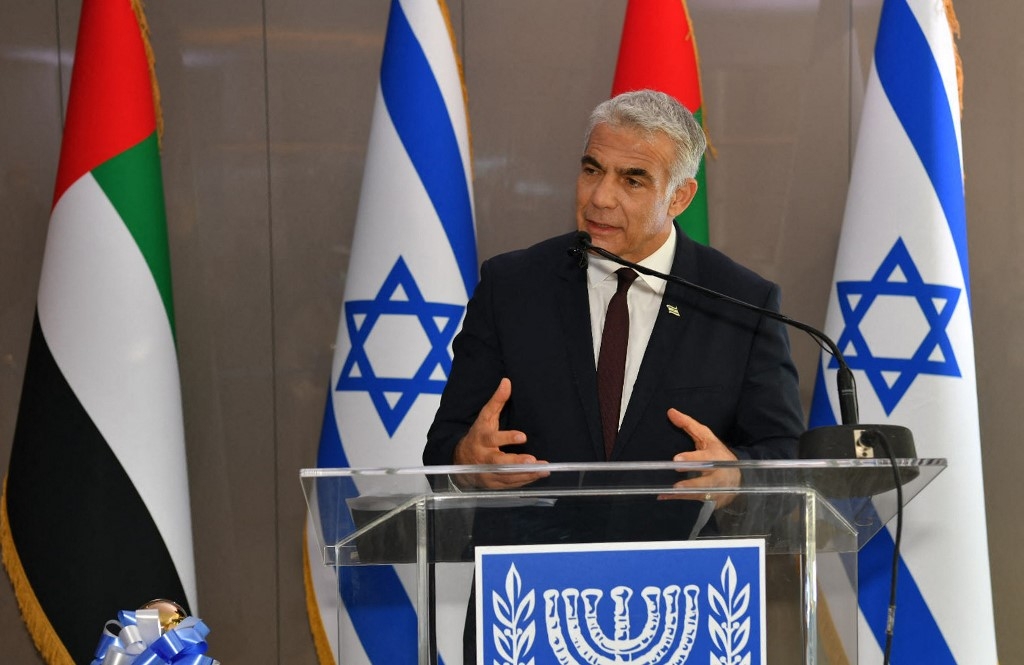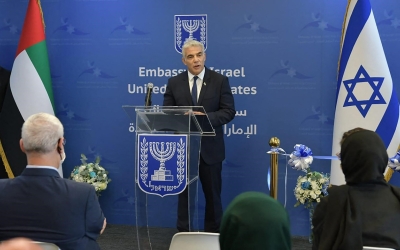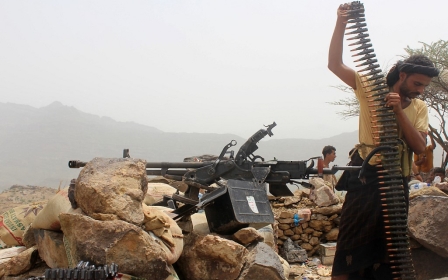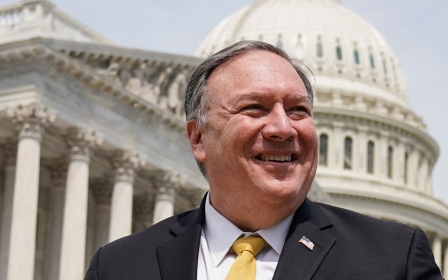Israel seeks to normalise ties throughout Middle East, says Lapid

Israel's foreign minister said his landmark visit to the United Arab Emirates (UAE) was aimed at reaching out to Arab states still wary of normalising ties.
Yair Lapid, the first Israeli cabinet minister to visit the Gulf state since the countries forged ties last year, also reiterated Israel's concern about the Iran nuclear deal being negotiated in Vienna.
The trip comes amid unease in Israel and Arab capitals about US efforts to re-enter the 2015 nuclear pact between Iran and world powers, which former US President Donald Trump quit in 2018 in a move backed by Saudi Arabia and its Gulf allies.
"This visit isn't the end of the road to peace, it is just the beginning," Lapid told reporters.
"Our hand is outstretched... I hope this visit is the first of many and that together with our new friends we continue to make history in the entire region."
New MEE newsletter: Jerusalem Dispatch
Sign up to get the latest insights and analysis on Israel-Palestine, alongside Turkey Unpacked and other MEE newsletters
Lapid declined to comment on whether Israel was coordinating with Gulf states over Iran, saying he did not want to "embarrass" his hosts by remarking on a neighbour while in the UAE, but noted his country was worried about the nuclear deal.
Saudi Arabia and its Gulf allies have called for a stronger deal of longer duration that also addresses Tehran's missiles programme and alleged support for regional proxies.
Tehran has repeatedly denied arming groups in the Middle East, calling such allegations "baseless".
Tensions have risen in the region since former US President Donald Trump pulled Washington out of the nuclear deal in 2018 and reimposed crippling economic sanctions on the Islamic Republic.
But US President Joe Biden and his top aides have sought to reimplement the deal through mutual compliance and then to strengthen some of its provisions, using the initial agreement as a platform to address other issues with Iran.
Last week, an Iranian official said Washington had agreed to remove all sanctions on Iran's oil and shipping sectors, and take some senior figures off a blacklist.
The remarks, made by outgoing president Hassan Rouhani's chief of staff, were consistent with previous assertions by officials in Rouhani's pragmatist camp that the US is prepared to make major concessions at the talks, underway since April in Vienna.
'Normalisation will escalate aggression'
The United Arab Emirates signed a US-brokered agreement to normalise ties with Israel during the final months of the Trump administration.
The agreements, known as the "Abraham Accords", shattered a longstanding Arab consensus that there should be no normalisation with Israel until it reaches a comprehensive peace deal with the Palestinians.
Palestinian leaders strongly expressed their disappointment with the deals, which are largely seen by Palestinians as a betrayal of Palestinian goals for statehood.
Bahrain, Sudan and Morocco all followed the UAE in normalisation agreements, in deals that failed to address the Palestinian issue or Israel's military occupation of the West Bank and its settlement expansion.
The UAE has said the accords, which challenged a decades-old allegiance to the Palestinian issue as a major driver of Arab policy, would ultimately benefit the Palestinians.
The UAE claimed Israel had promised to suspend its plans to annex parts of the West Bank, though annexation had already been shelved due to international pressure and a lack of US support.
The Gaza-based Hamas movement condemned Lapid's visit this week, saying it came while Israeli authorities destroyed a Palestinian-owned shop in East Jerusalem, territory which Israel captured in a 1967 war and which Palestinians seek for a future state.
"Normalisation agreements will encourage the occupation [Israel] to escalate its aggression against our people," Hamas said on Tuesday. Israel said the shop had violated zoning laws.
On Tuesday UAE Foreign Minister Sheikh Abdullah bin Zayed told Israel's Walla news site: "I believe that sooner or later Israel should resolve the Palestinian problem. This not only harms Israel's image, but is also liable to raise doubts as to its future. This is a big challenge for you."
Middle East Eye delivers independent and unrivalled coverage and analysis of the Middle East, North Africa and beyond. To learn more about republishing this content and the associated fees, please fill out this form. More about MEE can be found here.





